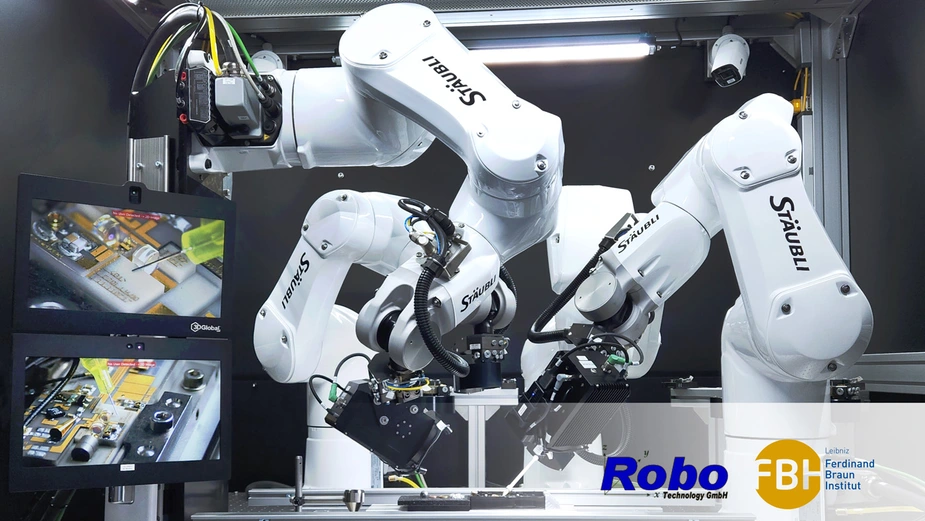Stäubli Award goes to novel robotics system 'Microbot'
Robo-Technology GmbH and Ferdinand-Braun-Institut developed the system for micro-assembly of photonic modules to be used in space and quantum technologies
At its Partner Summit, Stäubli Robotics honored Robo-Technology GmbH with its Partner Award in recognition of the innovation demonstrated with the intuitively operated "Microbot" system. The robotic system was jointly developed by the Bavarian company and the Berlin-based Ferdinand-Braun-Institut and, for the first time, facilitates the industry-compatible assembly of highly complex photonic modules. These are used, among others, in demanding space and in quantum technology applications.
On October 19, Robo-Technology GmbH received the Stäubli Robotics Award at this year's Stäubli Partner Summit. The Swiss company awards the prize every other year for unique achievements in the automation sector. Sole criterion is the degree of innovation of solutions utilizing Stäubli robots.
The award went to the intuitively operated collaborative robotic system "Microbot" developed to assemble complex photonic modules with utmost accuracy. The robust modules developed and manufactured by the Ferdinand-Braun-Institut, Leibniz-Institut für Höchstfrequenztechnik (FBH) are used in demanding space and quantum technology applications. The system concept developed jointly by FBH and Robo-Technology GmbH is tailored entirely to support the human operator. It uses a wide variety of Industry 5.0 elements and combines the experience and know-how of a human operator with the advantages of robotics. For example, many steps that had to be executed manually by human operators are taken over by robots, so that now extreme spatial precision can be maintained for many hours. The "Microbot" system is hence ideally suited to assemble FBH’s highly complex photonic modules for research purposes as well as for pilot and small series production. High precision, agility, resilience, versatility, and ability to adopt to future requirements are key features of the system. For the first time ever, the novel collaborative robotic facility enables industry-compatible production of highly complex hybrid micro-integrated photonic modules for use in quantum sensing and quantum computing.
Andreas Wicht, head of the FBH’s Joint Lab Quantum Photonic Components is enthusiastic about the cooperation: “Actually, we had expected that our ideas could not be implemented. We were impressed by how quickly and precisely the colleagues at Robo-Technology picked up our requirements and developed them into a joint vision. The quality of the robotic solution would have been unattainable without Robo-Technology's very broad portfolio of expertise, ranging from concept development through CAE-supported mechanical design, electrical and electronic control hardware development to software development and implementation of complex safety concepts.”
Robo-Technology has planned and implemented the robotic system including the control hard- and software. It has also developed various tools for the Stäubli robots according to the process requirements. “In order to be able to develop this highly complex facility, the very precisely defined technical requirements of our partner FBH and its visions for the intuitive control concept were indispensable,” explains Jürgen Bosse, Managing Director of Robo-Technology GmbH. “Together, we succeeded in realizing a system that takes the assembly of miniaturized modules a big step forward from the laboratory towards industry.” Among the challenges the partners successfully overcame in developing the "Microbot" are: collaborative robotics that offer the potential for full automation, extreme accuracy requirements, fully automated tool changes, intuitive operator control, and sequence programming, and all of this performed in a cleanroom environment.
The "Microbot" facility in detail
Four hexapods that actively adjust miniaturized optical components with nanometer resolution in a very confined space constitute the “core” of the robotic hardware. Four cleanroom-capable Stäubli TX2-60 six-axis robots form the outer robotic “shell” and perform tasks that previously had to be carried out by a human operator. These include, for example, the application of the smallest quantities of adhesives, the precise curing of adhesives using UV light, the coupling of laser beams into optical fibers as well as the guidance of stereo microscopes in order to monitor assembly processes.
Part of the overall system is a "digital twin" that is used to carry out R&D on system control, to train personnel, and to prepare assembly activities. The facility combines augmented reality (AR) glasses with gesture control of the system, as well as traditional and haptic input devices with force feedback capabilities. This allows the collaborative robotic system and its digital twin to be operated very intuitively. The advanced human-machine interfaces, the robotic hardware, and all measurement devices are controlled by a common software frame. Data collection on all devices used during assembly will enable data-driven partial automation with artificial intelligence (AI) methods in the future. This also applies to processes that cannot be formalized due to their complexity and therefore have so far been inaccessible to automation.
Contact
Petra Immerz, M.A.
Communications Manager
Ferdinand-Braun-Institut gGmbH
Leibniz-Institut für Höchstfrequenztechnik
Gustav-Kirchhoff-Straße 4, 12489 Berlin
+49 30 6392-2626
petra.immerz(at)fbh-berlin.de
www.fbh-berlin.de
Press release FBH, 23 October 2023
